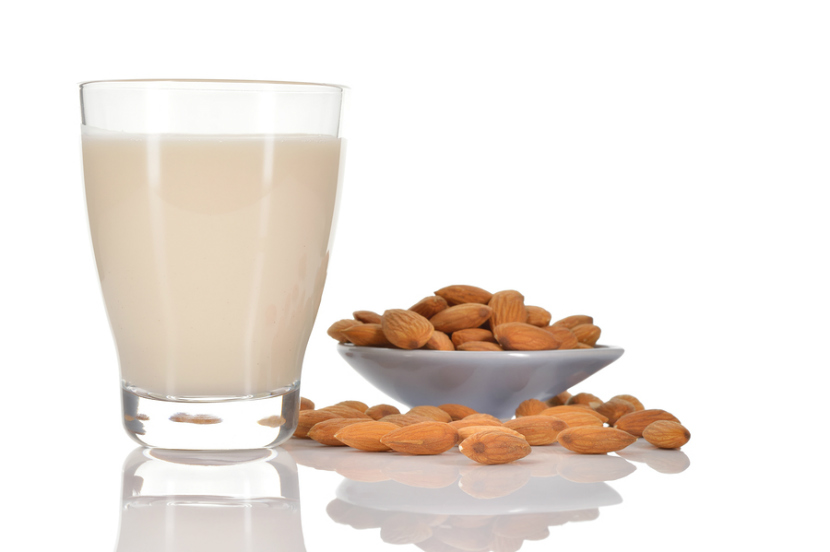
What do soy beverage, rice beverage and almond beverage have in common? They are all non-dairy beverages. With so many options available, it can be hard to know which one may be best for you. Read on for more information on non-dairy beverages and find out how they compare to cow’s milk.
What are non-dairy beverages?
Non-dairy beverages are beverages made from plants. Some non-dairy beverages are made from:
-
Soy
-
Rice
-
Almonds
-
Oats
-
Potato
-
Hemp
They are often used when a person does not drink cow’s milk or follows a vegan diet that excludes dairy products.
Which non-dairy beverages are part of Canada's Food Guide?
Only soy beverage is part of Canada's Food Guide. Soy beverage is found in the Milk and Alternative Food Group. Other non-dairy beverages do not have the same amount of protein and may not have the same amounts of vitamins and minerals as cow's milk and soy beverage. So that is why they are not part of Canada's Food Guide.
How do non-dairy beverages compare to cow’s milk?
Protein in non-dairy beverages
Cow’s milk has almost 9 grams of protein per cup. Non-dairy beverages range from 0 to 7 grams of protein per cup (see chart below). Compared with the other non-dairy beverages, soy beverages have the most protein.
Calcium and vitamin D in non-dairy beverages
The amount of calcium found in a cup of cow’s milk or fortified non-dairy beverages is about the same: 30% to 35% of your daily need.
Tip: Shake non-dairy beverages before you pour it. This will help ensure that the calcium ends up in your cup and not in the bottom of the container. Cow’s milk has 45% of your daily value of vitamin D per cup. Fortified non-dairy beverages have between 10% and 25%.
Sugar in non-dairy beverages
A cup of cow’s milk has about 13 grams of natural sugar from lactose. Most non-dairy beverages including soy, hemp, almond, rice and potato beverages are lower in sugar and are lactose-free. However, flavoured non-dairy beverages can contain twice the amount of sugar. To cut back on sugar, opt for the “original” or “plain” flavour, rather than sweetened varieties.
The chart below compares non-dairy beverages per cup*
|
Beverage (enriched; original flavour)
|
Calories
(kcal)
|
Protein
(g)
|
Fat (g)
|
Carbs
(g)
|
Sugar (g)
|
Calcium %DV
|
Vitamin D
%DV
|
|
Cow’s milk (1%)**
|
108
|
9
|
2.5
|
13
|
13
|
30%
|
45%
|
|
Soy
|
100
|
7
|
4
|
8
|
4
|
35%
|
25%
|
|
Hemp
|
100
|
4
|
6
|
8
|
6
|
30%
|
25%
|
|
Oat
|
130
|
4
|
2.5
|
24
|
19
|
35%
|
25%
|
|
Almond
|
50
|
1
|
2.5
|
6
|
5
|
30%
|
25%
|
|
Rice
|
120
|
1
|
2.5
|
24
|
10
|
30%
|
25%
|
|
Potato
|
70
|
0
|
0
|
20
|
2
|
30%
|
15%
|
*Current as of August 2012 for select brands. Not representative of all brands. Read Nutrition Facts panels to choose a beverage that is right for you.
** Skim, 1%, 2% and whole milk only differ in the amount of calories and fat it has.
Can children drink non-dairy beverages?
It depends. Children under 2 years of age should not be given non-dairy beverages because they do not have enough fat or protein to meet their needs. Whole cow’s milk is recommended for children under the age of 2. However, if your child has a milk allergy or is vegan, work with a registered dietitian to find the best option to meet his or her needs.
Children over 2 years of age can be given non-dairy beverages. Work with a registered dietitian to find a beverage that best meets their protein, vitamin and mineral needs.
A note on goat’s milk
All of the non-dairy beverages mentioned above come from plant sources. That means they do not contain animal products. Goat’s milk falls into a different category. It is milk from goats, so it is an animal product and contains lactose. That means it is not suitable for vegan diets.
Enriched whole goat’s milk has a similar amount of protein, vitamins and minerals as whole cow’s milk and can be used as a substitute. However, some people who are allergic to cow’s milk will also react to goat’s milk. Check with your doctor or dietitian to see what is right for you and your family.
Bottom line
If you choose non-dairy beverages, make sure that it is “fortified” or “enriched.” That means vitamins and minerals have been added to it. If it’s not fortified, it is not as nutritious. It will be mostly water, starch and sugar. There are many non-dairy beverages in grocery stores. Fortified soy beverage is nutritionally the most similar to cow’s milk and is part of Canada's Food Guide's Milk and Alternative Food Group. Other fortified non-dairy beverages are NOT part of the Milk and Alternative Food Group, however, they can still be a good source of calcium and vitamin D.
You may also be interested in:
The Juicy Story on Drinks
Managing Milk Allergies
Last Update – February 6, 2019